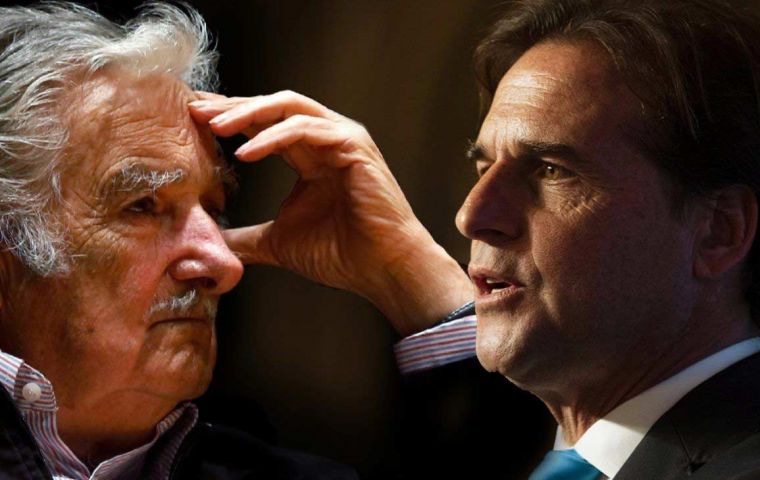MercoPress. South Atlantic News Agency
Lacalle Pou and Mujica found to be most popular politicians in Uruguay
 Lacalle's positive image was released on the day when opposition labor unions launched a general strike opposing his policies
Lacalle's positive image was released on the day when opposition labor unions launched a general strike opposing his policies Uruguay's President Luis Lacalle Pou (2020-2025) and ex-president José “Pepe” Mujica (2010-2015) top the list of most-liked politicians in the country, a survey by pollsters Equipos Consultores released Thursday showed.
The study measured four categories: a) popularity, b) appreciation or “support”, c) rejection, and d) net balance (appreciation minus rejection).
Item ”a)” measured how well-known a political leader was. It boiled down mostly to presidents and/or presidential candidates. Mujica and Lacalle Pou are universally known among Uruguayans (100% in the case of Mujica and 99% in the case of Lacalle Pou), followed by two-time former President Julio María Sanguinetti, Cabildo Abierto Senator (and former Army chief) Guido Manini Ríos and former Colorado Senator Pedro Bordaberry.
Mujica and Lacalle Pou are also the two political leaders most liked by the population, followed by Canelones Mayor Yamandú Orsi of Mujica's opposition Broad Front (Frente Amplio - FA) who many regard as a future head of state, together with Montevideo Mayor Carolina Cosse, and Senator (and former Vice President) Danilo Astori.
Those most rejected are Senators Juan Sartori (59%) and Manini Ríos (52%), while Lacalle Pou and Orsi have the best net balance (+13 and +10 respectively).
Lacalle's positive image was released on the day when “far more than one million” Uruguayans “voluntarily” joined the general strike called for by the Plenario Intersindical de Trabajadores-Convención Nacional de Trabajadores (PIT-CNT), according to the labor grouping leader Marcel Abdala.
The strike “has had an enormous adhesion, in the central administration, in all the companies, in the whole educational system -public and private-, in public and private banking, in construction, in all the manufacturing industry, in very important services, except for those cases such as health,” Abdala maintained.




Top Comments
Disclaimer & comment rulesCommenting for this story is now closed.
If you have a Facebook account, become a fan and comment on our Facebook Page!